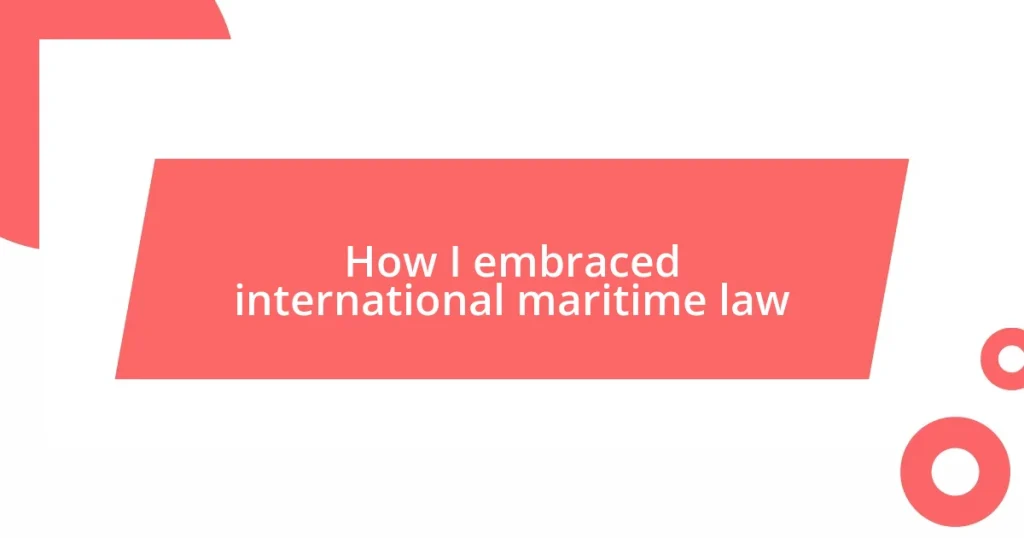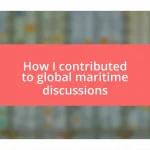Key takeaways:
- The significance of international maritime law, particularly through treaties like UNCLOS, SOLAS, STCW, and MARPOL, in regulating maritime boundaries, promoting safety, and protecting the environment.
- Navigating jurisdictional issues in maritime law requires understanding flag state jurisdiction and cooperative dialogue between nations to address complex scenarios like piracy and environmental protection.
- Building a maritime law career involves mentorship, continuous learning, and effective legal research, emphasizing the importance of staying informed and developing professional relationships in the field.
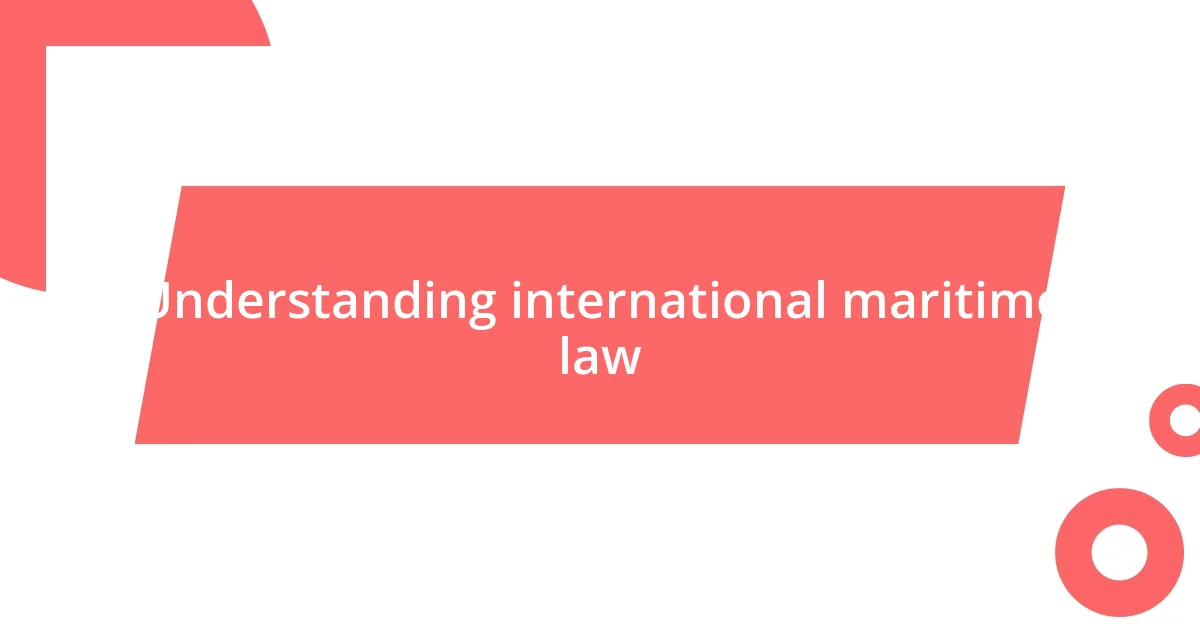
Understanding international maritime law
International maritime law governs the rules and practices related to the use of the world’s oceans and seas. I remember the first time I dived deep into this field; it feels like unlocking a treasure chest filled with complex treaties, conventions, and doctrines. Have you ever considered how these laws affect everything from shipping routes to environmental protection?
One of the pivotal agreements in this area is the United Nations Convention on the Law of the Sea (UNCLOS). I was always fascinated by how this treaty not only delineates national boundaries on the high seas but also promotes the sustainable use of marine resources. It made me think—how often do we consider the broader implications of our actions on such a global scale?
Digging into the intricacies of maritime law opened my eyes to the delicate balance between commerce, the environment, and human rights. Every case and clause often tells a story of its own, revealing the stakes involved in disputes over fishing rights or oil drilling in contested waters. I find myself asking, how does understanding these laws shape our collective responsibilities toward protecting our oceans?
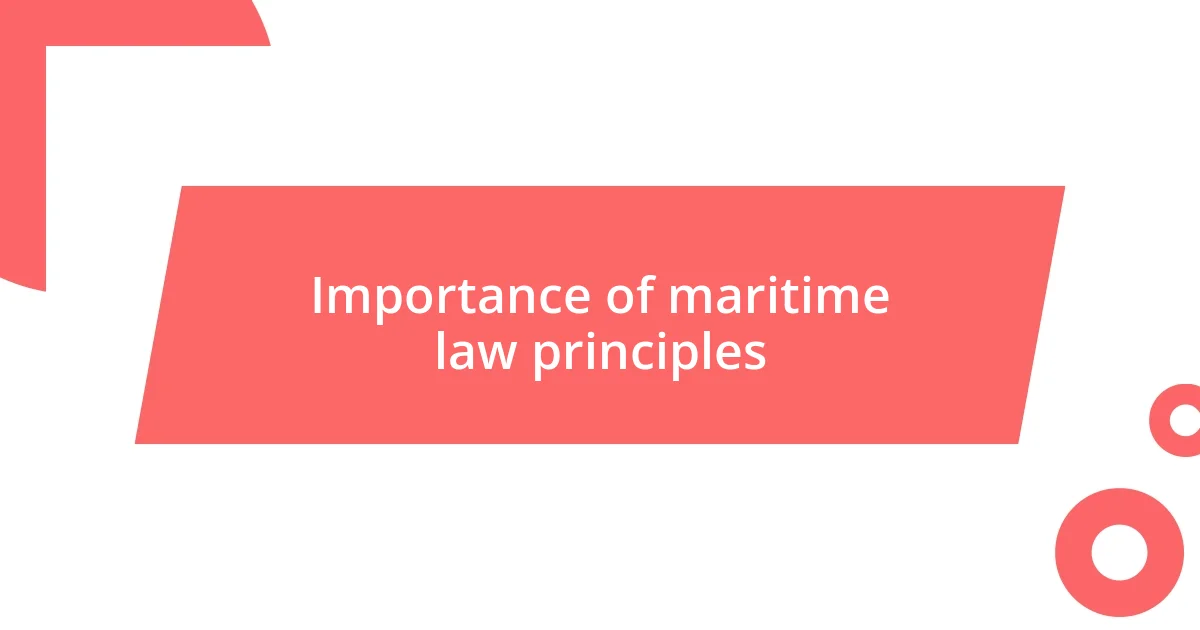
Importance of maritime law principles
Maritime law principles are foundational to ensuring fairness and order on the oceans. I’ve often reflected on the clarity such principles provide when navigating the complex world of international shipping. For example, I recall a time when I assisted with a dispute over cargo damage. Understanding the rules helped us pinpoint liability and resolve the issue quickly, highlighting just how critical these laws can be in real-world scenarios.
- They establish safety and environmental standards for shipping practices.
- They define jurisdiction in maritime disputes, ensuring everyone understands which laws apply.
- They protect the rights of seafarers and passengers, fostering a safer environment for all individuals involved in maritime activities.
This combination of rules not only promotes commerce but also safeguards vital resources, illustrating why maritime law principles are truly indispensable.

Key treaties and conventions
The realm of international maritime law is punctuated by several key treaties and conventions that shape its framework. One noteworthy convention is the International Convention for the Safety of Life at Sea (SOLAS). I still vividly recall the first time I encountered this treaty during my studies; it was like finding a lighthouse guiding ships through the murkiest of storms. SOLAS is vital because it establishes minimum safety standards in the shipping industry, ensuring that lives are protected while sailing distant waters. Can you imagine the sense of security that comes with knowing these regulations are in place?
Another significant treaty is the International Convention on Standards of Training, Certification and Watchkeeping for Seafarers (STCW). I remember participating in a training session focused on STCW, where the emphasis was on the qualifications of seafarers. It struck me how essential it is for crew members to be properly trained, as they bear the responsibility for their vessel, cargo, and most importantly, the crew’s safety. This convention ensures that no matter where they are in the world, there is a consistent standard of training that protects everyone on the high seas.
When considering the impact of these conventions, I often think of how they intertwine with the well-being of our oceans. The Environmental Convention, MARPOL, is another critical piece of international maritime law, aimed at preventing pollution from ships. Reflecting on my experiences, I can’t help but feel a deep sense of responsibility toward marine conservation. These treaties not only represent a legal framework but also a commitment to preserving the beauty of our oceans for generations to come.
| Treaty/Convention | Purpose |
|---|---|
| UNCLOS | Defines maritime boundaries and promotes marine resource sustainability. |
| SOLAS | Establishes safety standards to protect lives at sea. |
| STCW | Sets training and certification standards for seafarers. |
| MARPOL | Aims to prevent pollution from ships. |
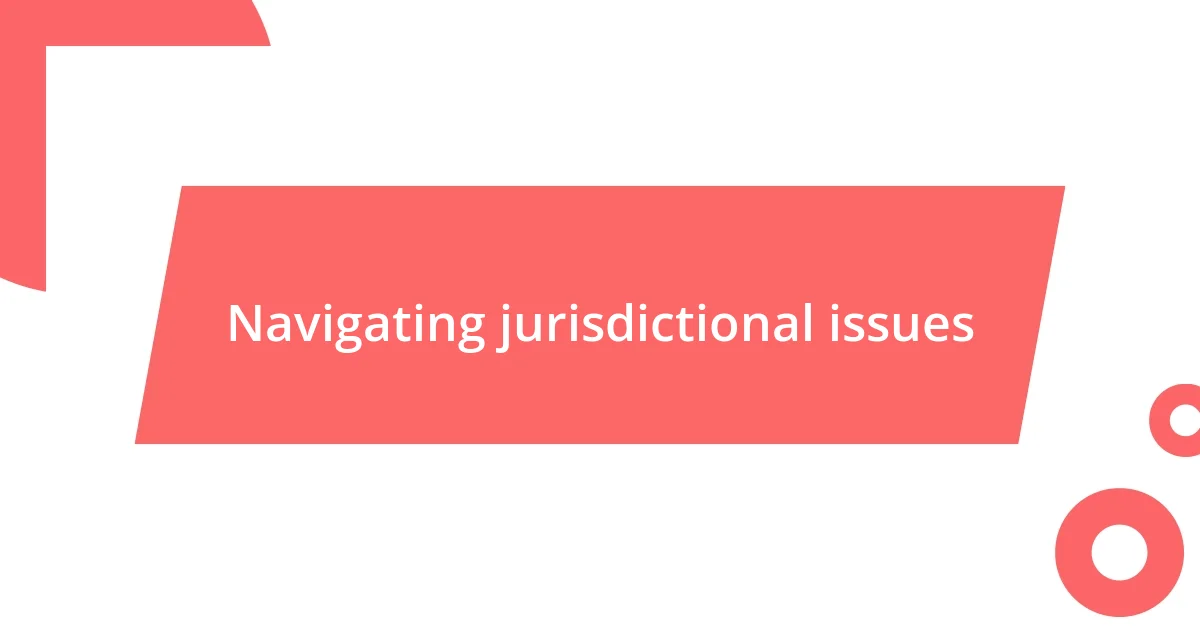
Navigating jurisdictional issues
Navigating jurisdictional issues in maritime law can feel daunting, particularly when multiple nations are involved. I recall a situation where I helped a shipping company manage a dispute over wreck removal in a foreign port. It was fascinating—and a bit overwhelming—to see how the laws of the coastal state intertwined with international regulations. You might wonder: how do you even begin to chart those waters? Understanding the principle of flag state jurisdiction, where a ship is subject to the laws of the country whose flag it flies, became my compass during this complex case.
The intricacies of jurisdiction can significantly affect proceedings, especially in cases of piracy or environmental damage. I once encountered a scenario where a vessel flagged in one country was apprehended by authorities of another because of alleged illegal fishing. It provoked a thought: who truly has the authority in these waters? The rules might seem clear-cut on paper, but real-life applications often reveal grey areas that require careful navigation. The need to balance jurisdiction and protect resources is not just a legal challenge; it’s an ethical responsibility that every maritime professional must wrestle with.
Often, I find that successful resolutions in jurisdictional matters stem from collaborative dialogue among nations. During a maritime conference, I listened to various legal experts share insights on how open communication can bridge gaps between conflicting laws. Have you ever thought about how crucial cooperation is in international waters? As I reflected on this, I realized that understanding jurisdiction is about much more than legal definitions; it’s about fostering a spirit of partnership that can lead to safer and more orderly seas for everyone involved.
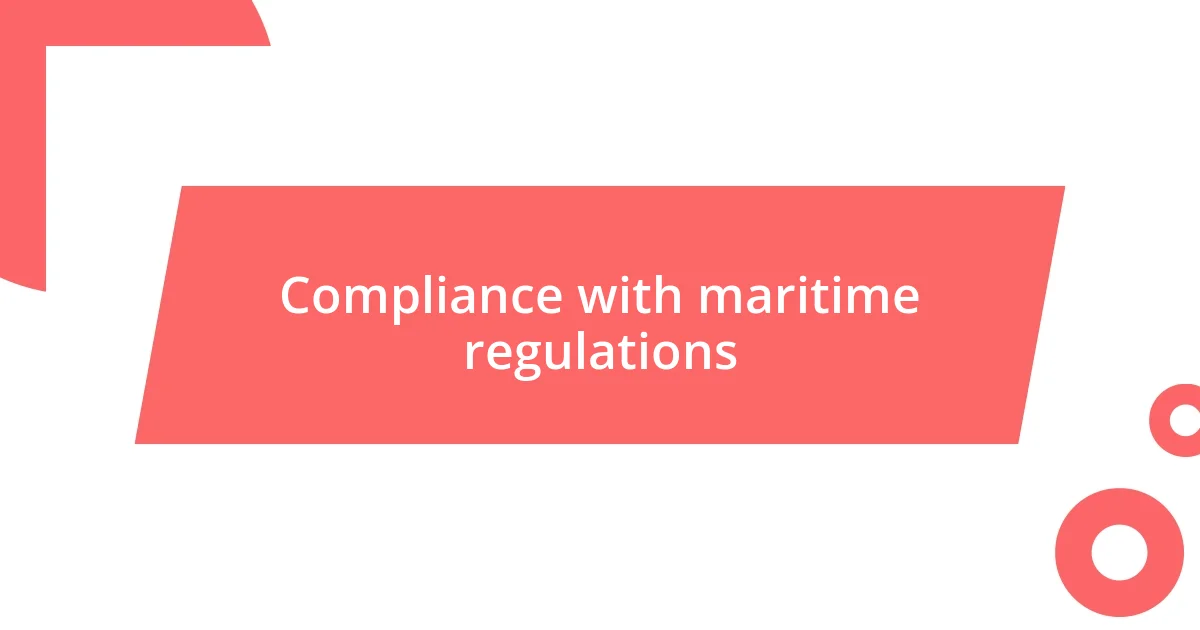
Compliance with maritime regulations
Compliance with maritime regulations is an ongoing journey filled with nuances that can impact safety and legality at sea. I remember a particularly eye-opening experience when I visited a bustling port where compliance measures were rigidly enforced. Observing the meticulous checks that vessels underwent before departure, I couldn’t help but appreciate the gravity of these procedures; they ensure not only the safety of the crew and cargo but also the protection of the marine environment. How often do we pause to consider the ripple effect that compliance—or non-compliance—can have on the oceans?
In another instance, I had the chance to engage directly with compliance officers during an audit process for a shipping company. What struck me was their unwavering commitment to not just adhering to the letter of the law but embracing its spirit. These officers often shared stories of how strict compliance has led to improved safety records and greater respect for marine conservation. It made me ponder: wouldn’t we all benefit from a more proactive approach in our endeavors, whether on land or at sea?
Reflecting on my journey through maritime law, I recognize an undeniable truth: compliance isn’t merely a checklist to tick off; it’s a vital lifestyle that can transform the industry. For instance, I witnessed firsthand how a company that ingrained compliance into its culture enjoyed not just legal peace of mind but also a stellar reputation. Isn’t it fascinating how prioritizing regulations can lead to a competitive edge in such a complex field? In my view, fostering a culture centered on compliance ultimately empowers us to safeguard our oceans and uphold the shared values we cherish as global citizens.
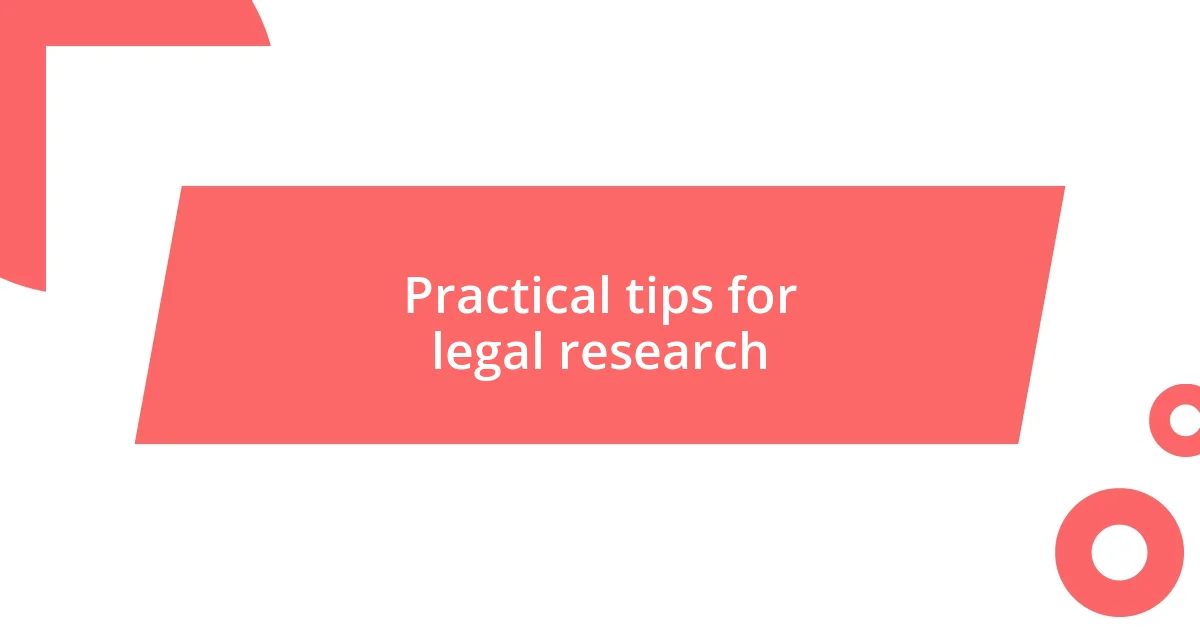
Practical tips for legal research
Conducting effective legal research is both an art and a science. One of my go-to strategies is identifying reliable databases early on. For example, I often turn to Westlaw and LexisNexis for comprehensive case law and secondary sources. It saves me a lot of time sifting through less relevant materials. Have you ever realized how much a few trusted resources can streamline your research process?
Engaging with subject matter experts has also proven invaluable in my own research. I vividly remember reaching out to a professor with specific questions about the nuances of international shipping laws. Their insights clarified several complex legal principles that had me stumped. It made me think—how often do we overlook the human element in research? Sometimes, a simple conversation can unlock understanding that dense texts can’t convey.
Networking with fellow practitioners at maritime law seminars has helped me gain different perspectives on emerging trends. These events are not just about absorbing information; they are excellent opportunities for dialogue. I’ve left many sessions feeling inspired and equipped with fresh ideas that directly impacted my case strategies. Have you ever thought about how each interaction can enrich your research endeavors? Embracing these connections truly enhances our capabilities in an ever-evolving legal landscape.
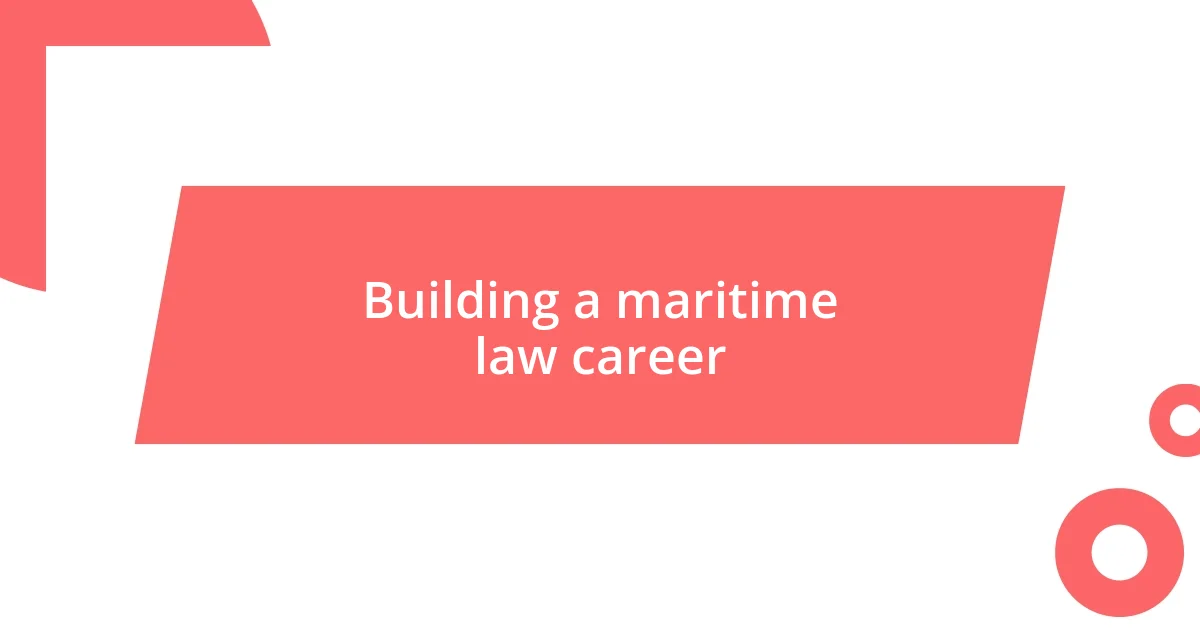
Building a maritime law career
Building a career in maritime law can feel both daunting and exhilarating. I can still recall my first internship at a maritime law firm, navigating through a sea of regulations and case law. It was overwhelming at times, but each challenging moment reinforced my passion. Have you ever experienced that thrill when solving a complex problem? For me, it was like unlocking a puzzle box, revealing not just answers but a deeper understanding of maritime complexities.
As I delved further into this field, I realized that mentorship played a crucial role in my development. One particular mentor, a seasoned maritime attorney, shared invaluable insights over coffee that shaped my worldview. Their tales of negotiation and litigation made me appreciate the delicate balance required in this practice. Reflecting on those conversations, I’ve come to believe that mentorship is like a lighthouse guiding newcomers through stormy seas. Wouldn’t it be incredible if everyone had that guiding light in their career?
Building a maritime law career also requires a commitment to continuous learning. The field is ever-evolving, with new regulations and international treaties constantly emerging. I often set aside time to read up on recent developments, and I cherish the moments when a new piece of knowledge sparks an idea for a case strategy. It’s exciting to think about how staying informed can enhance my effectiveness as an advocate. What do you think—doesn’t the journey of knowledge keep the flame of passion alive in our careers? The continuous pursuit of understanding not only enriches our expertise but also fuels our dedication to the maritime industry and its intricate legal landscape.










